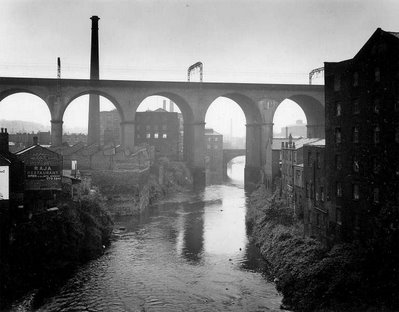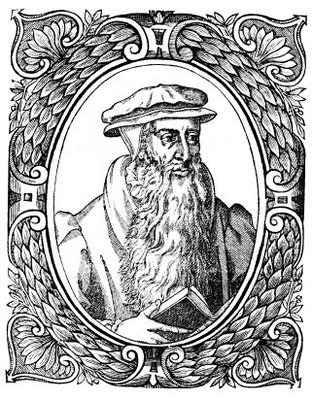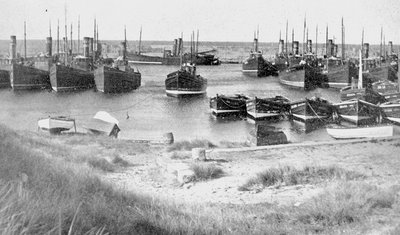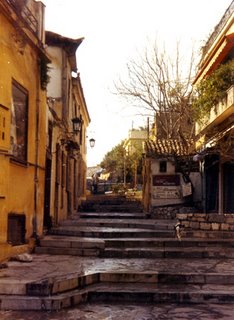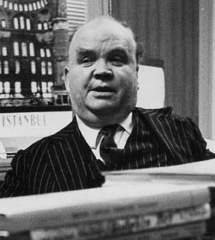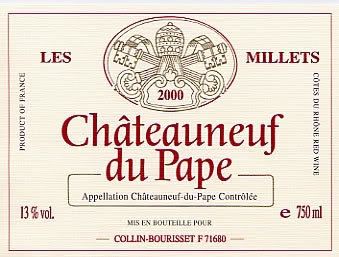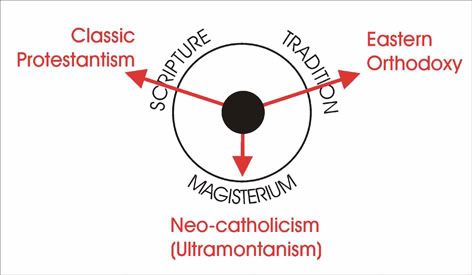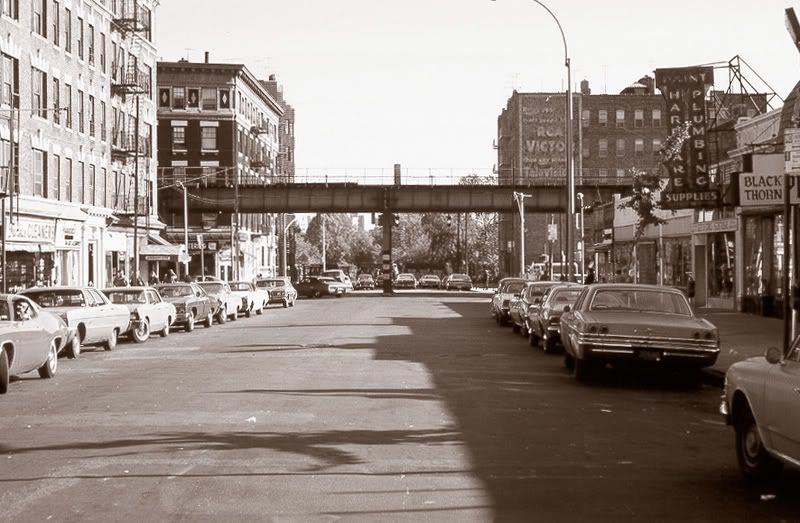 WEBSTER AVENUE
WEBSTER AVENUE
THE BRONX and a lopsided garden of frail skinny flowers and beyond that, the Puerto Ricans working in a factory beyond a cardboard fence. A frenzy of childhood, facile and free, milk cartons and bruised knees, t-shirts and jeans, dirt and its musty smell, broken trees and lame dogs in a neighborhood of rusty weeds and Irish gossips with red noses. Mrs. Connelly and her moppy dog, beady eyes and wagging tongue who stopped by Mrs. Sullivan's window on a warm Saturday morning, Mrs. Sullivan appearing, a face in a dark window to share her one confidence and many tales they would stay for hours as we children played around Connelly's old-shoed feet pulling her dog's tail and him yowling, Mrs. Connelly so engrossed in gossip as not to notice her dog's suffering as we laughed in our dirty sleeves and reached for her pennies. Mr. Sullivan, sallow, calling to his wife and whispering in his thinness for Mrs. Sullivan to waddle her fat into the kitchen to make his lunch. Green lettuce and carrots, trees and spring worms from the ground that teased our palms and made us laugh with tickles and squirms and reaching behind the cardboard fence with bottles of soda to squirt the Puerto Ricans at their lunch. Clubhouses of old paper cartons and dirt that oozed into our souls and
Let's Pretend on the radio with fairy tales to pillow our nerves and keep us whole for the falling leaves.
I HAVE A LITTLE CATHOLIC corner in my cupboard and reach beyond it for a prayer now and then; a world apart for lovers, with solemn chants and bells, feasting and sorrow and little trinkets, worry beads that speak I am hungry. School shoes, red ties, blue shirts and jackets, rosary beads and dirty fingernails and darkness, scapulars that glow in the dark; the confessional, and guilt streaming with the sun through stained glass.
Mea culpa, lies to cover sins - broken windows, pawings in the dark. Behind a pew on wooden boards, red knees and aching back bless me father (
I can't), sliding shutter and deep voice of the frocked priest and fear this is God I want to cry but there are no tears. Say three Our Fathers and three Hail Marys on the marble floor before the altar and
DON'T DO IT AGAIN....
Into Christmas snow and Mass with blue ears and burning fingers at nine o'clock in the hoary morning when all little atheists are fast asleep under heavy blankets, not caring and damned, but warm just the same. Quick, the holy water bless yourselves and genuflect as the water drips from ashen foreheads and into the eyelids wiped hastily to read the troublesome Latin as it slips through mouths and fingers in lazy responses. Clipped hair, missing teeth, children in a desert of lonely voices that howl absently through the pipes with old Mrs. Browning in her purple hair and glasses and rolled stockings tied above the knees and sagging into the shoes pounding a tired organ
Now sing children loudly above groaning pipes in the old choir loft,
Alleluia! with the Latin chant of three young priests spilling incense into the sleepy eyes and noses of the dressed-up congregation. The pointed finger of Sister Freddie, tiptoe quietly past the center and never pass without falling to your knees. Be quiet, gold-ringed finger raised to her lips, Sister Freddie marches us up the aisle, the shiny brass bell held silently until all hell breaks loose on St. Joseph's church steps and the bell flashes clanging to life for thundering silence everyone hides behind the other kid Sister Freddie's bumpy red face sodden with anger, Father O'Hara appearing at the top flashing the shillelagh money changers at the temple in all God's wrath to wield the stick against the child that yelled. Father O'Hara drove away in his Cadillac then and tousled heads and dirty faces standing sullenly in line and hasty notes passed around behind the watchful eye of Sister Freddie's angry bell.
CONFESSIONAL at the creaky pews, kneeling on raw earth: footstools feel primitive, but never mind think of what you did, what did you do? Disobey your mother, tell lies, impurity, can't tell that, that's awful, but it's the biggest sin, okay won't tell that, so that's a sin of omission, one, two, three, five sins, okay, I'm ready: is that O'Hara they're sending me to? Hope it's Murphy, sweet old man, tell him anything he just nods wisely and gives easy penance, wish I were outside, dark in here and scary, kids playing stickball on Bathgate Avenue, can hear their voices. Holy Virgin with the candles in front, will she move and show me with a real tear on the marble cheek I am foolish not to become a nun? O'Hara's voice booming loud from the dark confessional and the window slammed; O God I'm next and it's O'Hara: offered the kid next to me the dime I don't have to change places with me - shuddered and wouldn't go for it.
-
Bless me, father...He knows it's me, his head is bent, what is he thinking of? It's so dark I can barely see him, pretend it's not me - too late, all right, on with it, police station next door and God behind the little red curtain and the devil in the basement kid just hit a home run heard the sock of the stick on the ball
-
...for I have sinned.- How long since your last confession?
-
Oh, yeh, I forgot, sorry...uh, a week.What could I have done in five days quick think.
-
lied five times- Yes.
He doesn't believe me okay
-
'Scuse me father, six times.- Make it seven.
-
Yes, father.- Say the rosary for your penance and make your act of contrition, child, get on with it, and speak up, will you?
His voice is loud I know the kids can hear it,
OH, I FEEL SO BADhis fingers are drumming on the wooden window impatient to slam it. It is so dark in here like a mother's womb or hell must be, can't stand it only thing in the darkness O'Hara's Irish face with his shillelagh somewhere floating above him ready to strike.
-
loss of heaven and the pains of hell...- Wooden window slammed, I didn't finish.
Search in pocket for the plastic beads an hour at least on the marble steps before the altar - damn O'Hara. Another sin. Oh for some sunlight!
GUY NAMED SODA down the block walking twenty times past the house burping and swiping at the kids with one milky hand while fondling a pigeon under his dandruff coat with the other, mumbling tears and anger under a cloudy sky past the Jewish school on the corner where the boys fly out circled yarmulkes on their heads, one long curl straddling each cheek and fifteen books under each arm us teasing in a sing-song voice.
Why? said McGee transferring his cane to the other foot
we are all children of God me not answering and upset but loving McGee just the same little man tall as my eight years living with the rocking chair lady in the boarding house around the corner, eighty year McGee smart as a whip and old Bill Davis with one eye on mom and the other on us picking up dirty candy from the street him chiding as tobacco drips from a chewing mouth to stain his white shirt front hoping for an extra cigar from the cronies holding up Ryan's saloon wall all day long, his friend with the cancer ridden face, nose and mouth in white bandages fumbles in his pants for the nickel to give us as we mess up Schwartz's paper stand grabbing for Archie comics. Old man Schwartz grumbles behind his egg creams passing newspapers to the gray man, oatmeal face above a bowtie who lives above us in a gray furnished room and makes the trip slowly under massive stone weight just for the papers and nothing more, from room to candy store and gliding back again, a silent ship not smiling once but watching always.
THE EMPTY LOT around the corner an abandoned house and sad broken windows creaky floorboards to disappear under, haunted we thought and played happily up and down the echoing stairs and hide and seek among the rooms deserted by its hasty long gone owners, threadbare rug used as a tent and teepee, dog just lifted his leg on as we chased him out, Willy Gabriel calling him gently then booting him down the stairs Willy's mother screaming from the floppy house, curlers in her hair boyfriend's arm around her waist and beer in hand, William don't tease that dog Willy cringing and saying damn her, then running into the next room to pull his sister Patty's hair and scare her into thinking he's a ghost. Mrs. Gabriel not pretty not caring reaching for her hot iron as the dog yelps between her legs, stepped on peanut butter and jelly, all over Patty's face her mother wiping with the dishrag.
Bernie Rochester playing basketball long and skinny and all freckles, eating baby food because he liked it even though we laughed. Never had a girlfriend, never ate a steak. Johnny Reese stringy hair rotten teeth, ate sandwiches made of sugar had a brother always angry, me chasing Johnny up a skimpy tree to grab a kiss to see what it felt like not caring that he had no teeth and ate all those sugar sandwiches.
A HAPHAZARD WOODEN FENCE around a beer garden where on Sundays the Irish came, stringing balloons and drinking beers, harmonicas in the night and us peeking through the hole in the fence; bar all lit up and kids on tricycles playing at the boozy feet all rubbed in gravel and empty beer cans, midnight and the kids still playing red faced mothers growing cozy and over their fences into the strange man's confidence as one hand slips around her shoulder, a woman slapping the child tugging on her dress be good we'll go soon stop crying Tommy damn it smiling up at the man no longer stranger after warmth of beers and romance of the fly-infested tinsel lanterns making it prettier to the loneliest. Reaching for a paper flower to pin in her hair, the woman slips down on her face over the picnic table helped up by her new friend his face turned but jingling in his pocket other coins and glancing secretly at his watch, thinking of the job calculating time and the kid's waking hours, Mrs. Connelly screaming from her third floor window,
YOU KIDS GO HOME and me in the dark silence watching her red nose glisten in the moonlight.

IN MEMORIAM
JULIA BROPHY 1943 - 1995
Requiescat in Pace



